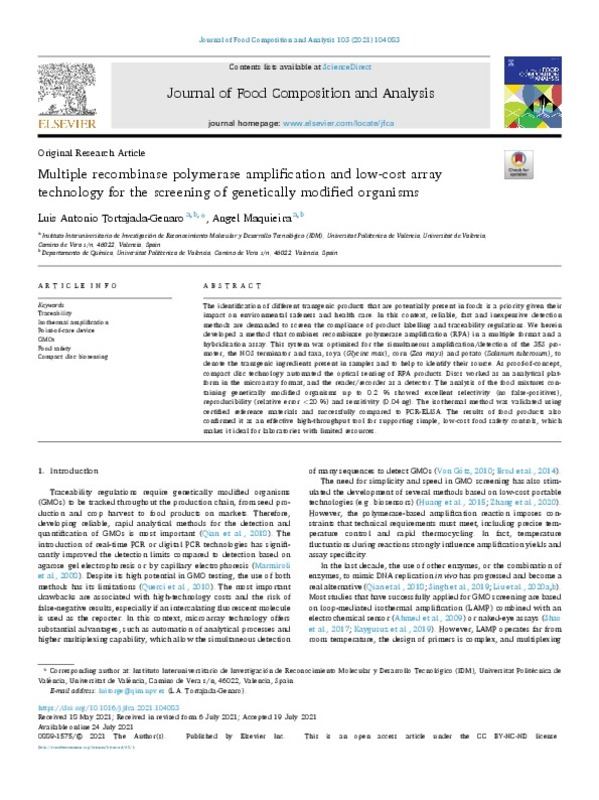JavaScript is disabled for your browser. Some features of this site may not work without it.
Buscar en RiuNet
Listar
Mi cuenta
Estadísticas
Ayuda RiuNet
Admin. UPV
Multiple recombinase polymerase amplification and low-cost array technology for the screening of genetically modified organisms
Mostrar el registro sencillo del ítem
Ficheros en el ítem
| dc.contributor.author | Tortajada-Genaro, Luis Antonio
|
es_ES |
| dc.contributor.author | Maquieira Catala, Ángel
|
es_ES |
| dc.date.accessioned | 2021-11-05T14:09:06Z | |
| dc.date.available | 2021-11-05T14:09:06Z | |
| dc.date.issued | 2021-10 | es_ES |
| dc.identifier.issn | 0889-1575 | es_ES |
| dc.identifier.uri | http://hdl.handle.net/10251/176357 | |
| dc.description.abstract | [EN] The identification of different transgenic products that are potentially present in foods is a priority given their impact on environmental safeness and health care. In this context, reliable, fast and inexpensive detection methods are demanded to screen the compliance of product labelling and traceability regulations. We herein developed a method that combines recombinase polymerase amplification (RPA) in a multiple format and a hybridisation assay. This system was optimised for the simultaneous amplification/detection of the 35S promoter, the NOS terminator and taxa, soya (Glycine max), corn (Zea mays) and potato (Solanum tuberosum), to denote the transgenic ingredients present in samples and to help to identify their source. As proof-of-concept, compact disc technology automated the optical sensing of RPA products. Discs worked as an analytical platform in the microarray format, and the reader/recorder as a detector. The analysis of the food mixtures containing genetically modified organisms up to 0.2 % showed excellent selectivity (no false-positives), reproducibility (relative error <20 %) and sensitivity (0.04 ng). The isothermal method was validated using certified reference materials and successfully compared to PCR-ELISA. The results of food products also confirmed it as an effective high-throughput tool for supporting simple, low-cost food safety controls, which makes it ideal for laboratories with limited resources. | es_ES |
| dc.description.sponsorship | MINECO Project PID2019-110713RB-I00 and GVAPROMETEO/2020/094. | es_ES |
| dc.language | Inglés | es_ES |
| dc.publisher | Elsevier | es_ES |
| dc.relation.ispartof | Journal of Food Composition and Analysis | es_ES |
| dc.rights | Reconocimiento - No comercial - Sin obra derivada (by-nc-nd) | es_ES |
| dc.subject | Traceability | es_ES |
| dc.subject | Isothermal amplification | es_ES |
| dc.subject | Point-of-care device | es_ES |
| dc.subject | GMOs | es_ES |
| dc.subject | Food safety | es_ES |
| dc.subject | Compact disc biosensing | es_ES |
| dc.subject.classification | QUIMICA ANALITICA | es_ES |
| dc.title | Multiple recombinase polymerase amplification and low-cost array technology for the screening of genetically modified organisms | es_ES |
| dc.type | Artículo | es_ES |
| dc.identifier.doi | 10.1016/j.jfca.2021.104083 | es_ES |
| dc.relation.projectID | info:eu-repo/grantAgreement/GENERALITAT VALENCIANA//PROMETEO%2F2020%2F094//HOLOGRAFÍA. UNA VIA PARA AFRONTAR NUEVOS RETOS EN BIOSENSADO/ | es_ES |
| dc.relation.projectID | info:eu-repo/grantAgreement/AEI/Plan Estatal de Investigación Científica y Técnica y de Innovación 2017-2020/PID2019-110713RB-I00/ES/HACIA EL BIOSENSADO HOLOGRAFICO AVANZADO/ | es_ES |
| dc.rights.accessRights | Abierto | es_ES |
| dc.contributor.affiliation | Universitat Politècnica de València. Departamento de Química - Departament de Química | es_ES |
| dc.description.bibliographicCitation | Tortajada-Genaro, LA.; Maquieira Catala, Á. (2021). Multiple recombinase polymerase amplification and low-cost array technology for the screening of genetically modified organisms. Journal of Food Composition and Analysis. 103:1-7. https://doi.org/10.1016/j.jfca.2021.104083 | es_ES |
| dc.description.accrualMethod | S | es_ES |
| dc.relation.publisherversion | https://doi.org/10.1016/j.jfca.2021.104083 | es_ES |
| dc.description.upvformatpinicio | 1 | es_ES |
| dc.description.upvformatpfin | 7 | es_ES |
| dc.type.version | info:eu-repo/semantics/publishedVersion | es_ES |
| dc.description.volume | 103 | es_ES |
| dc.relation.pasarela | S\447492 | es_ES |
| dc.contributor.funder | GENERALITAT VALENCIANA | es_ES |
| dc.contributor.funder | AGENCIA ESTATAL DE INVESTIGACION | es_ES |
| dc.subject.ods | 09.- Desarrollar infraestructuras resilientes, promover la industrialización inclusiva y sostenible, y fomentar la innovación | es_ES |
| dc.subject.ods | 08.- Fomentar el crecimiento económico sostenido, inclusivo y sostenible, el empleo pleno y productivo, y el trabajo decente para todos | es_ES |
| dc.subject.ods | 03.- Garantizar una vida saludable y promover el bienestar para todos y todas en todas las edades | es_ES |
| dc.subject.ods | 02.- Poner fin al hambre, conseguir la seguridad alimentaria y una mejor nutrición, y promover la agricultura sostenible | es_ES |








